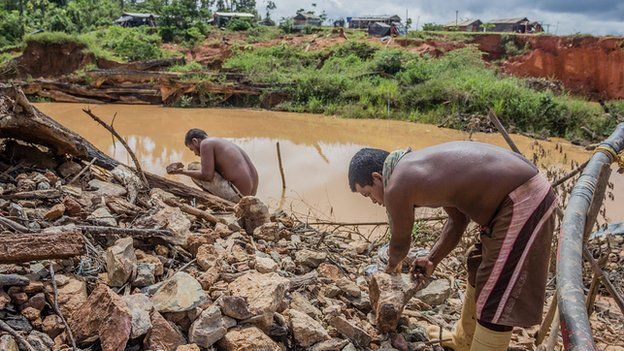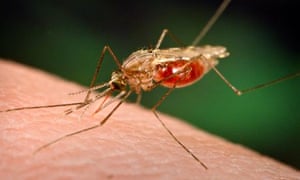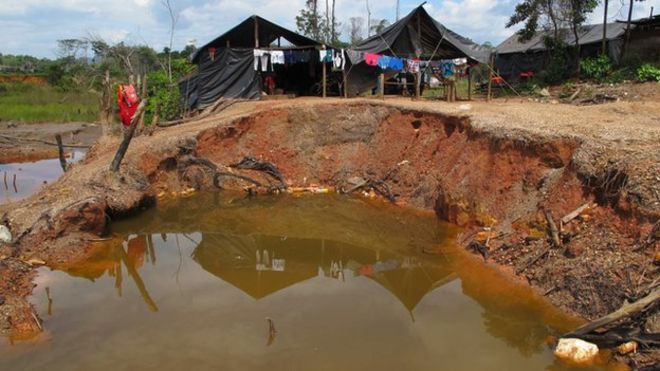Tumbling Backward in Time
"[The economic breakdown has] triggered a great migration in Venezuela, and right behind it is the spread of malaria."
"With this breakdown comes a disease that is cooked in the same pot."
Jorge Moreno, mosquito expert, Venezuela
 |
|
|
"It is a situation of national shame."
"I was seeing this kind of thing [malarial numbers] when I was a medical student a half-century ago. It hurts me. The disease had disappeared [in Venezuela, now only to return]."
"Only once malaria was gone, roads could come, industry. This was a sick country, and when it got well, things changed."
Dr. Jose Oletta, former Venezuelan health minister
"This is an emergency, this is an outbreak, and it's not being dealt with by the government this way."
"It's starting to spill over into neighbouring countries."
Dr. Leopoldo Villegas, international malaria expert, Bangkok, Thailand
 |
| Malaria has re-emerged in urban Venezuela for the first time since the country declared itself free of the disease in the 1960s. Photograph: James Gathany/AP |
At the turn of the 20th Century Venezuela was viewed as a vast hot zone for malaria infection. Former health minister, Jose Oletta echoed the ethos of the time in recognition that the country could only prosper and reach its social, industrial potential with the eradication of mosquitoes carrying the malaria virus. So Venezuela undertook to transform itself, led at that time by Dr. Arnoldo Gabaldon, the-then health minister who initiated one of the world's first deliberate efforts on a large scale to eradicate malaria.
Teams were deployed across the country where irrigation ditches were built to drain pools of standing water. They distributed quinine, and they constructed homes of cinder block in the rural areas where mosquitoes had bred. Dr. Gabaldon founded a research centre outside of Caracas in a recognized malarial zone to give the mission yet another, vital dimension from the perspective of science along with the practicalities of eradication.
And he undertook the extensive use of insecticides, including DDT, and success arose. Each rural home was sprayed to kill mosquitoes and fumigators would regularly leave messages indicating when next they would return to repeat the application. Malarial deaths had descended to nine per 100,000 population from the high of 300, by 1949. When Hugo Chavez assumed control of the country a half-century later, Dr. Gabaldon's system was no longer in use.
The Bolivarian revolution in Venezuela saw a growing dependence on oil revenue but by 2014 and 2015 revenues collapse as oil prices descended and the economy was restructured once again to find ways to pay for goods, services and imports leading to shortages of chloroquine and primaquine, drugs used to eradicate Plasmodium vivax, the most common malaria parasite plaguing the Americas. By 2016 doctors were seeing shortages of anti-malaria drugs and in particular falciparum, whose cost for a full round of treatment came in at just several dollars.
Venezuela's economic collapse, its political tyranny carried over by Chavez's successor, has led to severe food shortages and rioting people protesting their hunger as the government can no longer pay for vital imports fundamental to survival. Restaurants, grocery supermarkets, bakeries are routinely ransacked by starving people. People still with employment are paid with worthless currency, reflecting runaway inflation.
And people who have lost their employment look elsewhere to keep body and soul together. Reminiscent of Robert Mugabe in Zimbabwe wrenching successful farming enterprises away from Zimbabwe's white farmers and handing their land and their homes over to his former liberation-era fighter-colleagues, who just left the land idle, having no idea how to farm and no interest in doing so, leaving the country's economy and production in tatters, Chavez did the same thing with the Canadian mining company which controlled Venezuela's gold reserves.
The profits, he said, would fund his vaunted socialist revolution. Mismanagement and neglect ensued, and eventually the mines were just shut down, and left. Now, unemployed Venezuelans desperate for work, exit the urban centers and flock to the mines. An estimated 70,000 Venezuelans from all ares of the country representing all walks of life entered the mining region to hunt for gold, nearby water pits where mosquitoes lay their larvae, and malaria began to spread, infecting the workers who returned home and infected the general population.
And because the government of Venezuela is inept, corrupt and broke, the medications to fight malaria are no longer available. Medical facilities not only have no medicines to treat the burgeoning malaria outbreaks, they haven't the most basic of equipment to administer blood tests.
 |
|
|
Labels: Dysfunction, Economy, Malaria, Venezuela

<< Home